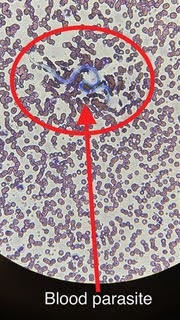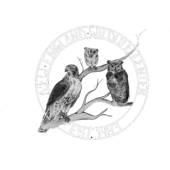
I’ve been a dog owner all my life and I am familiar with canine heartworm and the need for prevention. All my dogs are on monthly heartworm preventative and get tested yearly. Still, I was extremely surprised when a coyote that came into the Cape Wildlife Center this past week showed live heartworms in its blood sample. I don’t know why it never occurred to me that wild animals can get heartworm too. Heartworm is found in all 50 states and is a worldwide problem of domestic animals and wildlife.
Canine heartworm is a vector-borne disease that affects domestic dogs, coyotes, wolves, black bears, and red and grey foxes. It is passed from one animal to another through the bite of a mosquito. In dogs they may experience a cough, low energy or trouble breathing. Dogs can die from heavy infestations that lead to heart failure.
In the wild, coyotes can be stressed by an infestation, but mortality rarely occurs. Population-level effects are unlikely because coyotes do not show signs of the illness. The coyote we received with heartworm succumbed to injuries caused by a car strike, not because he was heartworm positive.
Foxes and bears also are uncommon hosts of the disease. Based on studies, it most likely that a domestic dog will contract the disease from a mosquito bite from a positive domestic dog, not wildlife.
After a mosquito bites an infected host, microfilariae develop in the mosquito for 9-16 days before being transmitted by bite to the next host. Larvae develops in the host’s connective tissue and muscles near the entry site and then migrates to the pulmonary arteries to complete their development into worms. This process takes 5-6 months. The cycle continues and repeats when the worms mate and reproduce again.
On rare occasions humans have been infested with microfilaria but adult heartworms never develop. Heartworm can also be seen in cats and ferrets.
Heartworm transmission is seasonal with the occurrence of mosquitos, but most veterinarians recommend that domestic pets take preventative year round. Transmission of heartworm infection is 100% in canines when exposed to infected mosquitos. Prevention and treatment for wildlife are not available right now.
Since transmission is through an infected mosquito bite, decreasing the mosquito population would help both wildlife and domestic pets. To decrease mosquitos, increasing their predators is a great way to start. Bats, owls, and other birds (especially purple martins and barn swallows), frogs, dragonflies, and spiders all eat mosquitos. Bats alone eat thousands a night. Set up your yard so that it is friendly to these species. Put up bat boxes and bird houses. Plant flowers that are friendly to mosquito eating insects. Get rid of all standing water outside. Change water in bird baths and pools at least weekly. Mosquitos lay eggs in and near water sources. Clean up damp humid areas such as dried leaf litter. Look into natural remedies to put around your house .
Some wildlife species can get heartworm, but the good news is that they are rarely host animals, and rarely die from the infestation, The current evidence suggests that they do not pose a threat to humans or pets, but with future studies that could change. Infected dogs are the biggest risk, so please get your dog tested and started on preventive treatment.
To learn more about the Cape Wildlife Center or help in their mission, visit www.capewildlifecenter.com or call 508 362-0111.
Caryn Ritchie is the volunteer coordinator for the Cape Wildlife Center and holds both a Massachusetts wildlife rehabilitator’s license and a federal permit to rehabilitate migratory birds.

Recent Comments